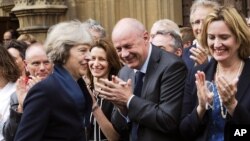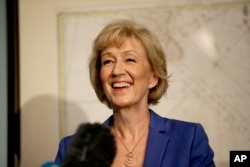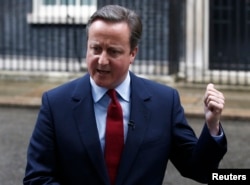Another day in post-Brexit British politics and more surprises. Government officials and Buckingham Palace were scrambling Monday to nail down the procedures for the country’s long-serving interior minister, Theresa May, to move into Downing Street on Wednesday, replacing outgoing Prime Minister David Cameron.
The scramble was triggered following the abrupt withdrawal by May’s rival, Andrea Leadsom, from what would have been a long, drawn-out contest to lead the country's Conservative Party. Leadsom, a mother of three, quit following a brutal weekend of media and party criticism for ill-judged comments in which she suggested that she was better equipped to be prime minister than the childless May.
In announcing her sudden withdrawal, energy minister Leadsom, one of the main campaigners for Britain to exit the European Union, said, “A nine-week leadership campaign at such a critical moment for our country is highly undesirable.”
She made no reference to the storm of criticism following her motherhood remarks. Critics said they showed her inexperience. They also went down badly with the party’s rank-and-file, who were set to choose between May and Leadsom in a postal vote that was to have concluded in early September.
"I have given up being surprised by anything these days," said Peter Lilley, a former Conservative minister.
Unexpected news
Certainly, the media had not expected Leadsom’s withdrawal. Most political reporters were covering the opposition Labour Party and reporting on Anna Eagle's announcement that she was formally challenging leftist Jeremy Corbyn for the party's leadership.
Eagle was left embarrassed as journalists rushed from her campaign launch to cover May's crowning as Britain’s second female prime minister.
See queen and resign
Leadsom’s exit saves the ruling Conservatives from what likely would have been an ill-tempered and divisive leadership contest pitching pro and anti-EU lawmakers against each other. And it has saved May from having to define clearly her position on Britain’s future relationship with the EU.
During last month’s Brexit referendum campaign, May favored Britain remaining an EU member. Following the vote, she committed to pulling the country out of the bloc. But unlike Leadsom and her "Leave" supporters, May wouldn't oppose the country's negotiating a close free-trade partnership with the EU. Such a partnership, EU leaders have said, must include free movement rights for EU nationals in Britain and Britons in Europe — a demand that infuriates Leave campaigners.
In the first few hours of high drama following Leadsom’s announcement, it was unclear how Cameron would hand off to May.
The outgoing prime minister ended speculation by making an impromptu announcement, saying he was "delighted we are not going to have a prolonged leadership contest" with "a long period of transition." Cameron said he would see Queen Elizabeth on Wednesday to resign.
Speaking outside 10 Downing Street, he said May was “strong, competent and more than capable of taking on the role of prime minister."
She will need strength as she steers Britain into unchartered political and economic waters following the Brexit referendum.
No mandate
May's first challenge will be in handling opposition parties' mounting calls for an early general election. None is due until 2020, but a snap election can be called if two-thirds of MPs vote for one. In 2007, May said Labour’s Gordon Brown, who succeeded Tony Blair in an uncontested party leadership election, should have a snap general election to secure a public mandate for his prime ministership.
“She has no mandate personally, and she should practice what she preaches and call an early election,” said Tim Farron, leader of Britain’s Liberal Democrats. “May is about to become PM without even the wider Conservative Party membership voting for her.”
He says that without a general election, it will remain unclear what kind of future relationship the country wants with the EU.
“I will support any calls for an election to seek legitimacy,” Eagle said.
Corbyn has also demanded an early election. However, with Labour in deep disarray and facing an ugly leadership contest of its own, calls by Labour for a snap poll strike Tony Newton Dunn, the political editor of the Sun newspaper, as akin to “a turkey asking for an early Christmas.”
May has already said she doesn’t believe the country needs to be hurled into more nationwide balloting, which would prolong uncertainty about the country’s future direction. Uncertainty is already roiling stock markets and has plunged the pound to its lowest value against the dollar in 35 years.
An election could also bring out internal Conservative divisions over what relationship Britain should have with the EU, say analysts. Many top Conservative Brexiters want no relationship at all; others are adamantly opposed to a free trade deal with the Europeans, if it involves free movement of people or Britain having to make contributions to the EU budget, as Norway does for its partnership with the EU.
“May will start her premiership facing a deep and dangerous split in the Conservative Party,” says James Kirkup, a political commentator. One of her biggest challenges, he argues, will be “how to deal with the significant number of Conservative MPs and Conservative members who actually wanted Leadsom to become PM or who at least wanted a proper contest to decide who got to be leader.
He adds: “The real risk for May is that some of Leadsom's backers believe that they have been cheated, their candidate unfairly shunted out of the race by political opponents and a hostile media.”
Some of May’s supporters see her as not dissimilar in style from Britain’s last woman Prime Minister, Margaret Thatcher, who left office 26 years ago. Some describe her as an Ice Queen — a description also used for Thatcher. Commentators and Tory lawmakers say like Thatcher, May, 59, is unclubbable and aloof.
Also like Thatcher, she maintains a ferocious work schedule, focusing on detail and working through government papers until two or three in the morning.
Last week, former Thatcher-era ministers Ken Clarke and Malcolm Rifkind were overheard discussing May over a TV studio microphone that they didn’t realize was on. “Theresa is a bloody difficult woman, but you and I worked with Margaret Thatcher,” Clarke said. Both men then burst out laughing.
Forty-eight hours later, May endorsed that description of her, saying Britain needs "a bloody difficult woman."






